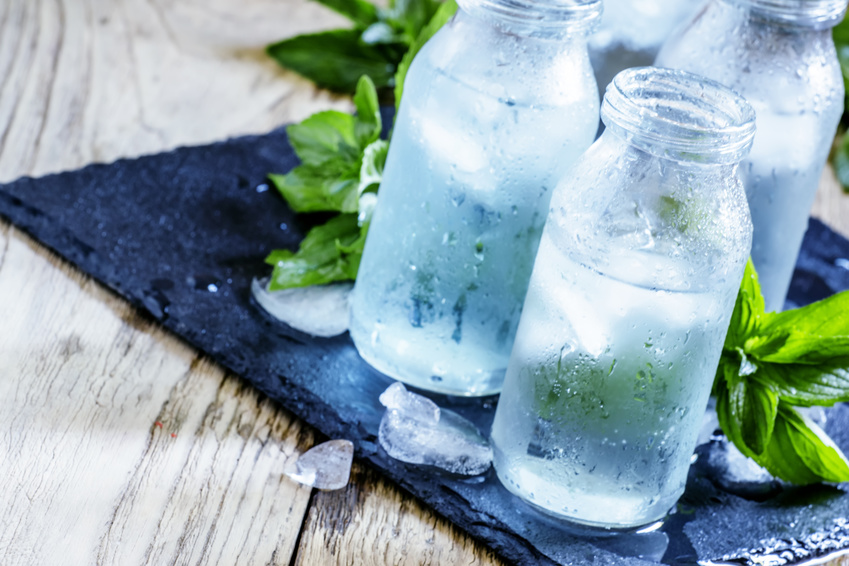There’s no doubt that water is absolutely essential for good health. But is there an ideal amount we should be drinking? And what’s the best way to get enough water for our bodies?
I’m a firm believer in bio-individuality (meaning that there is no one-size-fits-all diet and that each of us has unique requirements to thrive) so I’m not convinced there is a set amount of water that we all need— other than, we each need the right amount that is specific for our own unique body at any give time.
Many institutions and authorities have claimed that there is indeed a “specific” amount of water, however. The Food and Nutrition Board claims that ideal total daily water intake from food and beverages is 3.7 liters for men and 2.7 liters for women while the most popular water advice we often hear is to drink eight 8-ounce glasses a day. I’m sure we’ve also all heard the blanket statement that everyone should drink 60 ounces per day.
So who’s right? How much water do we really need? And what are the consequences of not drinking enough water?
As I mentioned, water is essential to our health because we are literally about 60% water. Primarily, our body uses water for transporting nutrients in cells, mucous linings, and detoxification. Because we lose it through our waste, sweat, and breathing every moment of the day, it must be replenished in order to prevent dehydration.
If the body becomes mildly dehydrated, one will likely become fatigued or thirsty, experience dry mouth, and develop headaches, constipation, joint pain, and dizziness. Severe dehydration can even cause irritability, sunken eyes, shriveled skin, low blood pressure, rapid heartbeat, fever, diarrhea, vomiting, bloody or black stools, disorientation and even unconsciousness.
The best way to replenish lost water is by drinking water itself; or consuming foods that have high water content such as watermelon and cucumbers. How much water an individual needs will depend on several factors such as:
- The length and intensity of exercise— because the more intense the exercise or the more one sweats, the more water will need to be replenished.
- Climate factors — if the environment is hot vs. cold or humid vs. very dry.
- Special factors— sickness, pregnancy or breastfeeding all require increased water intake.
- Anything else that may increase perspiration, body heat, or increased breathing rate (such as obesity) will require great water consumption.
So though there are no one-size-fits-all water recommendations I usually suggest people do the following:
- First identify your ideal weight.
- Divide that number in half.
- Take the above factors into consideration and increase water intake as appropriate.
- This will be your starting point for daily water intake in ounces.
If you feel thirsty at any time in the day it probably means you need to increase your daily intake. The goal is for YOU to determine what YOUR ideal amount is for any given day. Find the point where you are not thirsty but also not feeling waterlogged.
If you exercise, the American College of Sports Medicine recommends that you:
- Drink 17 ounces of water two hours prior to exercise or before an athletic event (this allows time to properly hydrate and excrete excess water before exercise).
- Start drinking water early and frequently during exercise to replace water lost through sweat.
- Drink water for exercise durations of one hour or less and not a carbohydrate-electrolyte drink as it is not necessary and may only increase unneeded calories.
- Include a carbohydrate-electrolyte drink if exercising for over an hour, to prevent fatigue.
How do you know you’re drinking enough water for your body? You should feel hydrated with the absence of the dehydration symptoms listed above. If at any time you feel parched, you’re already becoming dehydrated and it’s past time to take a drink.
A few other helpful tips . . .
It’s best not to chug water and instead drink a few ounces at a time. I also encourage my clients to drink more water earlier in the day and less towards nighttime so that it doesn’t interrupt their sleep.
Additionally, if you drink beverages with caffeine or soda, may dehydrate you. Herbal tea or water with lemon or mint are often better choices.
One last key suggestion is to consume the majority of your water in-between meals. If you’re drinking a lot of water with your meals, you’re likely diluting your digestive enzymes and prohibiting maximum digestion and absorption of your food, which means you may not be getting every ‘bang for your buck’ when you eat a bite of food.
Resources:
Nutrition and healthy eating. (n.d.). Retrieved July 29, 2015, from http://www.mayoclinic.org/healthy-lifestyle/nutrition-and-healthy-eating/in-depth/water/art-20044256?pg=2
Dehydration. (n.d.). Retrieved July 29, 2015, from http://www.mayoclinic.org/diseases-conditions/dehydration/basics/symptoms/con-20030056
Convertino, V., Armstrong, L., Coyle, E., & Mack, G. et. al. (1996, January 28). Result Filters. Retrieved July 29, 2015, from http://www.ncbi.nlm.nih.gov/pubmed/9303999
Disclaimer:
All content on this website is for educational purposes only. Always discuss any dietary modifications, dietary supplement use, or adjustments in dosages of any prescription medications with your doctor.

